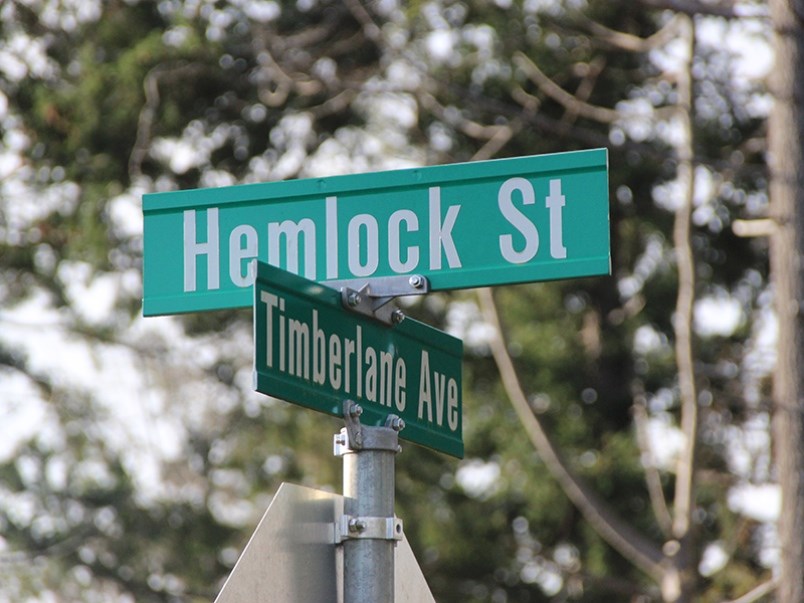After denial of an appeal to the Agricultural Land Commission (ALC), City of Powell River will have to restore the Hemlock Street loop near Timberlane Park to its original state.
In a nine-page ruling, the ALC ordered the city to remediate the 0.2 hectares of land on Hemlock Street. Chief administrative officer Russell Brewer said given that the appeal was not successful, staff is under direction to start doing the work necessary to make sure the order is implemented by August 31.
Brewer said the remediation order from the ALC outlined what is required, so staff will make it happen.
“We’ll have to go out to tender, a request for proposals, or quotes for contractors to do the work,” said Brewer. “We’ve included money in the budget for that work and I’m confident we’ll be able to meet the requirements of the order by August 31.”
In a news release on April 25, city director of infrastructure Tor Birtig said the city is ready to implement a plan that will meet the requirements of the ALC ruling.
“The road will be ripped up,” said Birtig. “Everything has to be put back to the previous natural state so that means removal of the asphalt, concrete curbing, any fill that's placed in there for road structure and removal of the lighting and wiring in that area.”
Birtig said the cost estimate for the work is $100,000; far less than previous estimates to remove the road, remediate the soil and provide emergency access.
“It’s fairly straightforward, taking up the road and remediating it to previous condition under the direction of a qualified environmental professional,” said Brewer. “We’ll make sure that’s done.”
Powell River resident George Orchiston, who was granted intervenor status by the ALC appeal panel, said he thought the ALC decision regarding the appeal was appropriate. He said the city paid no attention to the ALC Act or the city’s brand new subdivision bylaws in granting the right of way and road within it.
“It wasn’t a surprise,” said Orchiston, of the ALC panel’s decision for remediation of the 0.2 hectares on Hemlock Street. “City council, in passing the resolution to appeal, did not describe or demonstrate any basis for their appeal. I was disappointed the city went ahead with the appeal in the first place and I thought that the city appealing it was a total waste of time and money.”
Orchiston said he thought the appeal panel did an excellent job in making its decision. He said his arguments as an intervenor were restricted to abuse of process arguments.
According to the ALC written decision, the essence of the City of Powell River appeal was that the minor scale of the intrusion (0.2 hectares), the poor soil capability of the Agricultural Land Reserve (ALR) land and the cost of remediation made the ALC order unreasonable.
The ALC appeal panel found the city to have ignored the ALC’s legislated authority in its dedication and construction of the road. In addition, the panel found the city’s support of and submission of applications for exclusion and the road to be inappropriately timed – following rather than preceding road dedication and construction.
The panel found the remediation order to be appropriate given the ALC authority over non-farm land uses in the ALR, including road right of way and construction, plus the ALC Island panel’s initial refusal of the city’s application for a right of way.
The panel stated the city argued that remediation of the road would lead to additional degradation of the site. The panel found that the current state of disturbance is already significant due to the presence of fill, clearance of vegetation and disturbance of the existing soil structure, including but not limited to soil compaction resulting from construction. The remediation of the site to an agricultural standard would be unlikely to have any further significant negative effects of the agricultural capability of the site or adjoining areas, the appeal panel stated.
On the matter of the cost of remediation, the city argued there is a severe financial burden to taxpayers to remediate the site and this could also reduce agricultural investment by the city to establish a horticultural training facility and develop the property for agriculture. The panel was unconvinced that the cost of remediation is a severe financial burden or that the city will proceed with the planned agricultural development.
The city indicated it was prepared to offset or compensate for the impacts of the use of 0.2 hectares for a road right of way by including more than 0.2 hectares into the ALR, either on the property or elsewhere in the city. The panel found this offer to be irrelevant to the matter of the remediation order.
The appeal panel stated, in summary, that it was not persuaded by the city’s arguments and confirms the remediation order.



